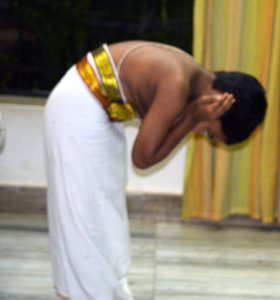abhivAdanam
abhivAdanam
abhivAdanam is a reverential salutation by a person to an elder person/teacher accompanied with a brief introduction of his lineage like gOtra, shAkhA, sootra, and his name (sarman) given to him according to the nAmakaraNa samskAram.
Sage “ushana:” says in chapter 1.30 of “ushana samhitA”:
गुरुंदृष्ट्वा समुत्तिष्ठॆदभिवाद्य कृताञ्जलि: |
न तैरुपविशॆत् सार्द्धं विवदॆन्नार्थ कारणात् ||
guruM dRuShTvaa samuttiShThEdabhivaadya krutaanjali:
na tairupavishEt saarddhaM vivadEnnaartha kaaraNaat.
On seeing an elder person, one should stand up with folded hands and salute him with abhivAdanam. He should not sit at par with him or argue with him on any account.
A dvija / twice born who has received the sacred thread can start doing abhivAdanam.
One should do abhivAdanam to ELDERS as a gesture of respect and gratitude towards them. This is a way of introducing yourself as the descendants of the great sages. The elders in turn shower their blessings on you praying for prosperity. (pratyabhivAdanam).
abhivaadyaashcha poorvvantu shirasaavadhasharmma cha |
braahmaNa kShatriyaadyaishcha shreekaamai: saadaraM sadaa||
अभिवादन शीलस्य नित्यं वृद्धोप सेविनः ।
चत्वारि तस्य वर्धन्ते आयुर्विद्या यशोबलम् ॥
abhivaadana sheelasya nityam vruddhOpa sEvinaha| chatvaari tasya vardhantE aayurvidyaa yashObalam ||
When ever you meet elders, you must rise from your seat (PratyutthAnam प्रत्युत्थानम् ).
Do sAshtAnga namaskAr साष्टङ्ग नमस्कारम् 2 or 4 times facing the elders (abhi mukham), you should not face south, facing east is the best.
Close your ears with your palms, bow and tell aloud your abhivAdanam. (Please click on “My abhivAdanam” tab to view your personalised abhivAdanam. At the end when you say “asmi bho:” touch their feet or the floor in front of the person with crossed hands. (your right hand must touch their right foot and left hand must touch their left foot).
The elderly person should hear the abhivAdanam carefully, understand your lineage, and bless you with soothing words called “AsheerwAda: आशीर्वाद : “
A few blessing words which the elders can use as AsheervAdam :- For example:- If your name is “shriram”, then the elder says “AyushmAn bhava shriram sharmA”
1. AyuShmAn bhava १. आयुष्मान् भव (May you live long) 2. deerghAyushmAn bhava २. दीर्घायुश्मान् भव (May you live a complete and long life) 3. deergha sumangala bhava ३. दीर्घ सुमङ्गल भव (May you have good fortune) 4. yashasvee bhava ४. यशस्वी भव (May you live with fame) 5. tejasvee bhava ५. तेजस्वी भव (May you have brilliance) 6. varchasvee bhava ६. वर्चस्वी भव (May you be energetic) 7. medhAvee bhava ७. मेधावी भव (May you be intelligent) 8. shreer bhava ८. श्रीर् भव (May you have all auspisciousness) 9. aShTaishvaryavat bhava ९. अष्टैश्वर्यवत्भव (May you possess the eight fold wealth) 10.sukhee bhava १०.सुखी भव (May you have happiness) 11.vijayee bhava ११.विजयी भव (May you be victorious)
दॆवान् नदीन् सभाम् वृक्षान् अग्निकार्यम् तथा यतिम् ।
दन्डवत् प्रणमॆत् भूमौ न अभिवादन् माचरॆत् ॥
1 .Namaskaar and abhivAdanam to elders should not be done in Temples. Only the diety can be prostrated. “abhivAdanam” is not done to dieties.
2. It is also not done to rivers or sacred trees.
3. It is not done to BrahmachAris (unmarried) and SanyAsis.
4. “abhivAdanam” should not be performed to a group/sabhA of elders. It is only one to one basis.
5. “abhivAdanam” cannot be done to women, but can be done to your MOTHER.
6. “abhivAdanam” can be done to your guru’s wife as she is in the capactiy of a mother.
7. It is also not done before the sacred fire. In all the above places, namaskArAs must be done like a falling stick.
Elders stand testimony to the fact that maturity can be gained only through discipline and perseverance. They can give you unconditional love and advice, out of their compassion. Their blessings are not mere words, but soothing energy currents that calm your mind. Please take time to feel that intimate blessing by doing abhivAdanam.



